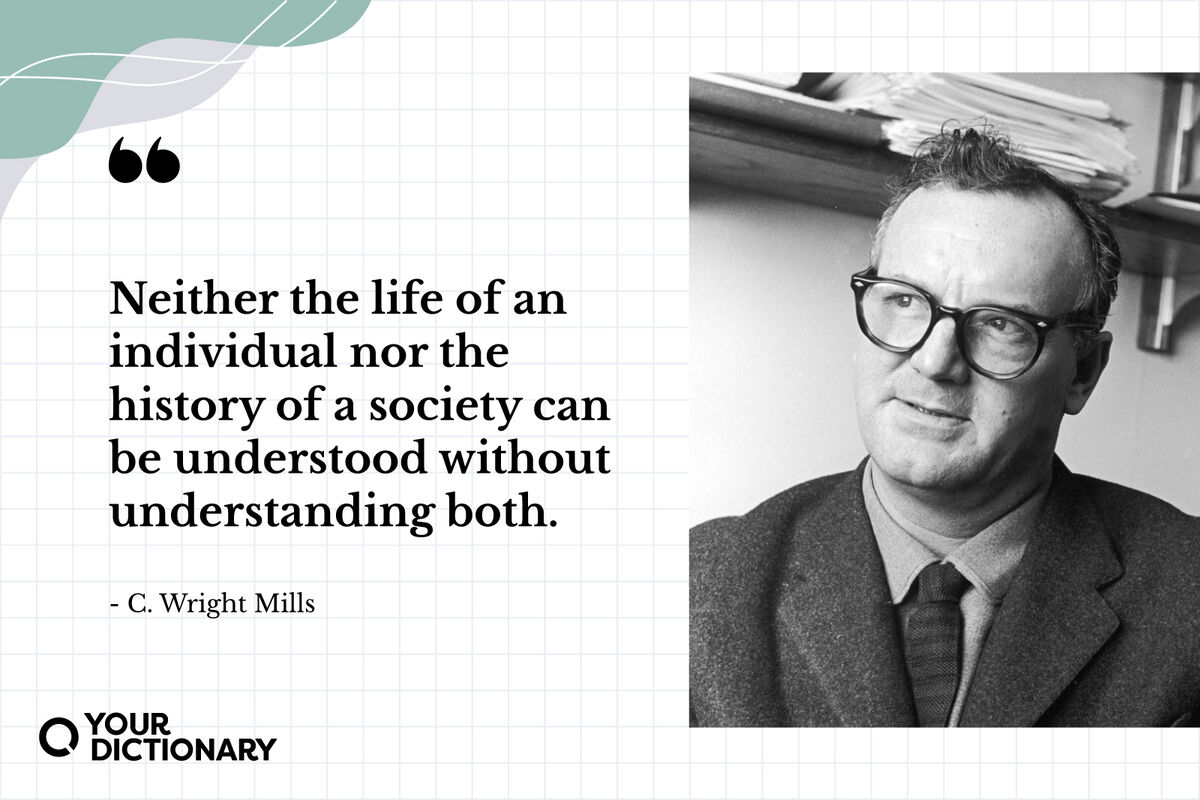Have you ever wondered why your friend, who grew up in a similar environment, chooses a vastly different career path than you? Or perhaps you’ve noticed how the same event affects people differently based on their social background? These seemingly personal experiences hold deeper societal implications, and understanding them is the core of what sociologist C. Wright Mills famously termed “sociological imagination.”

Image: politicalscienceguru.com
This powerful tool allows us to see beyond individual experiences and connect them to broader social forces. It helps us recognize how our personal troubles are often intertwined with public issues, shaping our lives and influencing our choices in unexpected ways. This article delves into the meaning of sociological imagination, explores its applications, and provides real-world examples to help you develop your own analytical lens for understanding the world around you.
The Art of Seeing Beyond the Personal
Imagine you’re struggling to find a job and feeling overwhelmed by the pressure of bills and financial obligations. From a purely personal perspective, you might attribute your struggles to your lack of skill or effort. However, sociological imagination invites you to look beyond this individualistic perspective and consider the broader social context.
The unemployment rate, limited access to quality education, and widening income inequality could all play a role in your predicament. These social structures are not your personal fault, but they significantly affect your opportunities and ultimately your life chances. This realization is the foundation of sociological imagination – understanding that our individual experiences are shaped by larger social forces.
Examples of Sociological Imagination in Action
Sociological imagination isn’t a passive observation; it’s an active tool for analyzing and interpreting the world. It empowers us to question assumptions, challenge stereotypes, and gain a deeper understanding of social phenomena. Let’s explore some examples:
1. The Family Dinner Table: A seemingly ordinary family dinner can reveal a wealth of sociological insights. Observing who sits where, the topics of conversation, and the power dynamics at play can shed light on cultural norms, gender roles, and class differences. For example, a family where the father consistently dominates the conversation might reflect patriarchal structures prevalent in society.
2. The College Application Process: Deciding where to apply for college and what major to pursue often feels like a deeply personal choice. However, sociological imagination reveals the influence of social class and access to resources. Students from wealthy backgrounds may have a more significant advantage due to their access to private tutors, college prep courses, and influential networks.
3. Navigating the Healthcare System: The decision to seek medical help is often a personal one, but access to quality healthcare is heavily influenced by social factors like income, race, and location. Sociological imagination prompts us to question why certain communities have a higher prevalence of chronic diseases or limited access to specialized care.
4. Social Media and the Rise of Fake News: The proliferation of fake news and misinformation online raises questions about why these narratives resonate with some audiences. Sociological imagination helps us understand the role of social media algorithms, polarization of political views, and the spread of conspiracy theories in shaping public opinion.
5. The Global Pandemic and Economic Inequality: The COVID-19 pandemic exposed and amplified existing social inequalities. Sociological imagination allows us to analyze how the virus disproportionately impacted marginalized communities, revealing the deep-seated social structures that perpetuate healthcare disparities, job insecurity, and limited access to essential resources.
Beyond Observation: Making a Difference
Sociological imagination isn’t just about comprehending the world; it’s about taking action to create positive change. Equipped with this critical tool, we can:
- Challenge Existing Norms: By questioning the assumptions and power dynamics embedded in societal structures, we can identify and address issues like discrimination, social injustice, and environmental degradation.
- Advocate for Systemic Solutions: Instead of focusing solely on individual solutions, sociological imagination prompts us to advocate for systemic change that addresses the root causes of social problems.
- Promote Social Justice: Understanding how social forces shape individuals’ experiences empowers us to work towards a more equitable and just society.

Image: www.yourdictionary.com
Cultivating Your Own Sociological Imagination
Developing sociological imagination is a lifelong process that involves curiosity, critical thinking, and a willingness to challenge the status quo.
- Embrace Empathy and Perspective-Taking: Put yourself in the shoes of others with different backgrounds, experiences, and social positions to gain a broader understanding of their realities.
- Question Everything: Be skeptical of readily accepted narratives and delve deeper into the complexities of social issues, seeking multiple perspectives and exploring various interpretations.
- Engage with Social Issues: Stay informed about current affairs and participate in discussions and debates that challenge established biases and foster a more nuanced understanding of social phenomena.
Examples Sociological Imagination
The Power of Seeing the Bigger Picture
Sociological imagination is a vital tool for navigating the complexities of our interconnected world. By recognizing the influence of social forces on our individual lives, we can better understand our experiences, make informed decisions, and ultimately, contribute to creating a more just and equitable society. So, the next time you encounter a social issue, remember to step back and consider the broader context, the unseen forces at play, and your role in shaping a better future.

:max_bytes(150000):strip_icc()/OrangeGloEverydayHardwoodFloorCleaner22oz-5a95a4dd04d1cf0037cbd59c.jpeg?w=740&resize=740,414&ssl=1)




